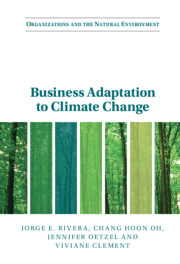Book contents
- Business Adaptation to Climate Change
- Organizations and the Natural Environment
- Business Adaptation to Climate Change
- Copyright page
- Dedication
- Epigraph
- Contents
- Figures
- Tables
- About the Authors
- Foreword
- Preface and Acknowledgments
- Publication Acknowledgments
- Part I Introduction
- Part II Conceptual Framework
- Part III Empirical Studies of Business Adaptation to Nature Adversity
- 6 Canary in the Coal Mine
- 7 MNC Disregard of Natural Disasters and the Role of Host Country Context
- 8 MNC Disaster Experience and Foreign Subsidiary Investment
- Part IV Conclusions
- Bibliography
- Index
8 - MNC Disaster Experience and Foreign Subsidiary Investment
from Part III - Empirical Studies of Business Adaptation to Nature Adversity
Published online by Cambridge University Press: 28 April 2022
- Business Adaptation to Climate Change
- Organizations and the Natural Environment
- Business Adaptation to Climate Change
- Copyright page
- Dedication
- Epigraph
- Contents
- Figures
- Tables
- About the Authors
- Foreword
- Preface and Acknowledgments
- Publication Acknowledgments
- Part I Introduction
- Part II Conceptual Framework
- Part III Empirical Studies of Business Adaptation to Nature Adversity
- 6 Canary in the Coal Mine
- 7 MNC Disregard of Natural Disasters and the Role of Host Country Context
- 8 MNC Disaster Experience and Foreign Subsidiary Investment
- Part IV Conclusions
- Bibliography
- Index
Summary
In Chapter 8, we empirically examine the research questions conceptually discussed in Chapter 5: Are MNCs able to gain experiential advantages from managing during natural disasters that enable them to enter and expand into other countries experiencing similar risks? And how do MNCs’ experiences with natural disasters compare to those associated with terrorist attacks and technological disasters? We used a panel dataset with 57,500 observations from 106 European Global Fortune 500 MNCs and their subsidiaries operating across 109 countries during a seven-year period, 2001-2007. We find that experience with high-impact natural disasters (as well as terrorist attacks, and technological disasters) can be leveraged for expansions into an existing host country but not for initial entry into other countries experiencing similar high-impact disasters. We also find that experience with low-impact natural disasters does not appear to reduce the negative effect of disaster severity on expansion (or entry). A notable exception, experience with high impact floods does show a positive and significant moderating effect on the negative link between disaster severity and MNC entry. N14:N15
Keywords
- Type
- Chapter
- Information
- Business Adaptation to Climate Change , pp. 171 - 222Publisher: Cambridge University PressPrint publication year: 2022

